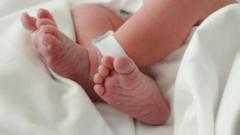Are Leeds Maternity Units Really Rated Inadequate?

Maternity Services in Leeds: A Deep Dive into the Recent CQC Downgrade
The recent downgrade of maternity services at Leeds Teaching Hospitals NHS Trust has sent shockwaves throughout the community. With the Care Quality Commission (CQC) labeling these services as "inadequate," there are growing concerns about the safety and quality of care provided to mothers and their newborns. This situation has drawn attention not only from healthcare professionals but also from families affected by the reported issues. In this article, we will explore the factors leading to this downgrade, the implications for families, and what the trust is doing to improve its services.
The CQC Inspection: Key Findings and Concerns
The CQC, England's healthcare regulator, conducted unannounced inspections at Leeds Teaching Hospitals in December 2024 and January 2025. Their report highlighted several critical areas of concern affecting maternity and neonatal services:
- Risk Management: Breaches in risk management protocols raised alarms about patient safety.
- Safe Environment: Concerns were raised about the physical and operational environments in which care was delivered.
- Learning Following Incidents: A lack of effective learning processes following incidents was noted, hindering improvements.
- Infection Prevention and Control: Inadequate infection control measures were identified, posing risks to both mothers and babies.
- Medicines Management: Issues related to the management of medications were also highlighted.
- Staffing Levels: A critical shortage of qualified staff, particularly in neonatal services, was a significant concern.
Staffing Shortages: A Persistent Problem
One of the most alarming findings from the CQC's inspection was the documentation of 170 maternity "red flag incidents" due to staffing issues between May and September 2024. These incidents indicate that staff levels were inadequate to provide safe and effective care, leading to potential harm to patients.
Furthermore, the CQC's findings revealed a worrying shortage of qualified staff in neonatal units, particularly for babies with complex medical needs. This shortage has raised serious questions about the ability of the trust to offer the necessary level of care for vulnerable newborns.
Impact on Families: Heartbreaking Stories
The consequences of these systemic failures have been devastating for families. Over the past six months, the BBC has spoken to 67 families who reported experiencing inadequate care at the trust. These families shared harrowing accounts, including cases where babies suffered avoidable injury or even death due to the failures in care.
One particularly heartbreaking story is that of Amarjit Kaur and Mandip Singh Matharoo, who lost their baby, Asees, in January 2024. They believe that better treatment could have saved their child. Their case highlights the urgent need for systemic changes within the maternity services to prevent similar tragedies in the future.
Whistleblower Accounts: An Inside Look
In addition to the families' testimonies, five whistleblowers have come forward to express their concerns about the disparity between the CQC's previous "good" rating and the reality of care being provided. These insiders argue that the issues highlighted by the CQC were not new and had been present for years, suggesting that the regulatory body was slow to act on persistent problems.
Response from Leeds Teaching Hospitals NHS Trust
In light of the CQC's findings, Leeds Teaching Hospitals NHS Trust has publicly committed to making significant improvements in its maternity and neonatal services. Chief Executive Prof Phil Wood emphasized the trust's priority to ensure safe, compassionate care and to address the highlighted concerns.
As part of their action plan, the trust announced plans to recruit 35 newly qualified midwives this autumn and to create additional midwifery leadership roles. These steps are aimed at bolstering the workforce and improving the quality of care delivered to expectant mothers and their babies.
Ongoing Monitoring and Future Inspections
The CQC has made it clear that it will closely monitor the trust's services in the coming months, conducting further inspections to ensure that improvements are being made. Ann Ford, the CQC's director in the north of England, stated that the regulator appreciates the courage of those who shared their concerns, as it allows for a more accurate assessment of care quality.
Calls for Independent Review and National Inquiry
In light of the CQC's findings, all 67 families who spoke to the BBC have called for an independent review of the trust's maternity services. They have specifically requested that this review be led by senior midwife Donna Ockenden, who is known for her expertise in maternity safety. Additionally, bereaved parents from across England have urged Health Secretary Wes Streeting to initiate a national inquiry into maternity safety, emphasizing the need for broader systemic changes.
Conclusion: The Road Ahead
The downgrade of maternity services at Leeds Teaching Hospitals NHS Trust is a wake-up call for the healthcare system in the region. The systemic issues highlighted by the CQC inspections raise serious questions about patient safety and the quality of care provided to mothers and infants. As the trust works to implement improvements, the stories of affected families serve as a poignant reminder of the human impact of these systemic failures.
The path forward will require not only immediate action but also a commitment to long-term cultural changes within the organization. Only through sustained efforts can the trust hope to restore public confidence and ensure that families receive the safe, compassionate care they deserve.
As this situation continues to evolve, it raises important questions about the role of healthcare regulators and the need for accountability in the NHS. How can we ensure that all mothers and babies receive the high-quality care they deserve? The answers may lie in more rigorous oversight and a commitment to listening to the voices of those most affected by these systemic issues.
Frequently Asked Questions
What led to the downgrade of maternity services at Leeds Teaching Hospitals NHS Trust?
The downgrade was primarily due to findings from CQC inspections, which highlighted serious concerns about risk management, staffing levels, and the overall quality of care provided to mothers and newborns.
How many families reported inadequate care at the trust?
The BBC has spoken to 67 families who reported experiencing inadequate care at the trust, including cases involving avoidable injury or death of their babies.
What actions is Leeds Teaching Hospitals NHS Trust taking in response to the CQC findings?
The trust has committed to recruiting 35 newly qualified midwives and creating additional midwifery leadership roles to improve staffing levels and the quality of care.
Will there be any further inspections by the CQC?
Yes, the CQC plans to closely monitor the trust's services and conduct further inspections to ensure that the necessary improvements are being implemented.
What do affected families want from the government regarding maternity services?
Affected families are calling for an independent review of the trust's maternity services and have urged for a national inquiry into maternity safety led by Health Secretary Wes Streeting.
As we reflect on the ongoing developments in Leeds, it is crucial to consider the broader implications for maternity services across the UK. Are we doing enough to ensure that every mother and baby receives the care they need? #MaternityCare #LeedsHospitals #PatientSafety
Published: 2025-06-19 23:49:06 | Category: technology



